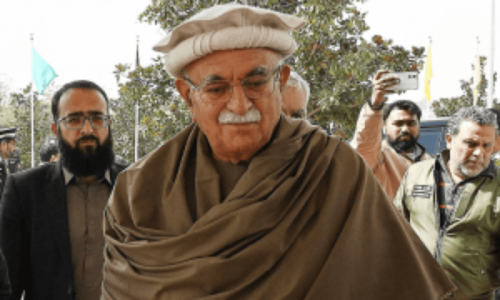
A SOMBRE mood prevails over the grandiose Quetta Railway Station. The whiff of carnage that took place here two days ago is palpable in the air.
The station, otherwise buzzing with passengers arriving in or leaving the city, is deserted. There are more police constables than travellers and more barbed wires than luggage or cargo.
As I approach the station, my mind involuntarily relishes its picturesque surroundings — the green of trees, trains, tracks and bridges in the background.
A question by one of the police constables standing at the main entrance breaks the stream of my thoughts.
The railway platform, otherwise buzzing with passengers now presents a desolate look
“Yes! Whom are you going to meet?” he asks.
“Muhammad Zubair, the station superintendent,” I respond calmly.
I arrive at the platform with signs — and smell — of death and destruction both on the ground and above. Shards of broken glasses and tiles are interspersed with splashes of human blood on the ground where 26 people lost their lives in an explosion which tore through the platform’s thick tin roof.
According to media reports, most of the victims were army personnel from the School of Infantry and Tactics.
Inside the station, I was standing with my pen and paper, scribbling down notes, when a retired railway worker came to talk to me. He doesn’t want me to name him as he vents exasperation. He is angry at the government over its failure to maintain peace in the city.
They have never been serious about the province and its people, he says about the authorities. He tells me that two cleaners and a porter (coolie) were also among the deceased.
“They were unfortunate,” he tells me as we stand on the platform. They were already poor, he says, before adding that now “their families will suffer more”.
The two cleaners, Imran Victor, 39, and Ayaz Masih, were best friends. They had been working together for over 15 years since Masih’s transfer from Sibi to Quetta. Masih belongs to Balochistan’s Sibi, and Imran is a local.
After learning this, I went to Imran’s house in Quetta to talk to his brothers and children. Like the platform, there are hardly any people to condole over Imran’s death at his house in Bel-ata, a Christian-dominated locality in the Joint Road area.
Under a shade, four people are sitting. One of them is Sunil Victor, one of the five siblings of Imran, whose parents died a long time ago.
Imran is survived by three young children. “Two are boys and one girl,” Sunil tells me after we prayed for the departed soul.
Sunil is also an employee of the railway department. He works at the office of the divisional superintendent. He used to pick up his brother from the platform and they both would come home on Sunil’s motorbike.
“On that day, I didn’t go to the office,” Sunil says about the day of the explosion. This, he believes, is the reason his brother is no longer in this world. “Had I gone, I would have picked him up, and he could have been saved,” Sunil rues.
Every day after work, when Sunil went to pick his brother, the three of them — the two brothers and Masih, whom Sunil referred to by his moniker Punnu — would sit and have tea on the platform.
As I listened to Sunil, someone sitting next to us interjected: “We were told they were having tea together on the day of the explosion. They died together on the spot.”
Sunil then continues and recalls the call through which he learnt his brother was injured and taken to a hospital.
“When I visited the hospital, he was lying dead,” he tells Dawn.
Stories, like the one narrated by Sunil, of loss and grief are rife at the station. But there are also those who survived the explosion.
Zubair, the station superintendent, tells Dawn he “narrowly survived the explosion”.
“Fortunately, I was sitting inside my office and was not outside when the blast took place.
“The explosion [left] my whole body numb and ears closed,” he tells me over a cup of tea in his office. “We miraculously remained safe. Thank God,” he says.
Published in Dawn, November 12th, 2024















































Dear visitor, the comments section is undergoing an overhaul and will return soon.